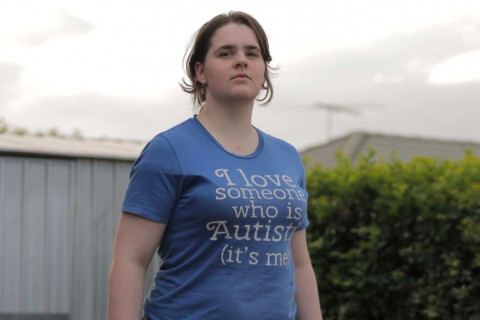
Nas Campanella, Celina Edmonds
Autistic student Maria Scharnke plans to spend her life fighting for justice for young people with disabilities, after experiencing physical and psychological abuse at schools across two states.
Key points:
- Maria Scharnke told the royal commission students should not have to obscure their disabilities
- She said she often found school to be a hostile place, where she was misunderstood
- She now attends a high school with disability support, and mentors other students
The 17-year-old final year student gave evidence to the Disability Royal Commission's inquiry into the education system.
She told the inquiry she had been excluded from activities, removed from classes as a disciplinary measure and isolated without supervision.
"School has at many times absolutely been a hostile environment that did not understand who I was," Ms Scharnke said.
"In every school there are good teachers and bad teachers and I've had some horrendous teachers.

Maria Scharnke is now a mentor to other young students
"Psychologically [and] physically in many different schools."
Ms Scharnke told the inquiry after four years of intense assessments she was diagnosed with autism in 2009 at the age of six.
Her teacher, at a school in regional Victoria, did not believe it.
"She refused to believe that autism existed and claimed I was just a naughty child who needed to be disciplined," Ms Scharnke said.
She told the royal commission she was "physically abused" by staff at the school.

Maria Scharnke wants to pursue a career in justice to advocate for other people who live with disabilities.(ABC News: Lucas Hill)
Later that year, Ms Scharnke's family moved to Queensland, where she attended a public primary school.
Her first year was more positive but she said "culture shifted" when a new principal arrived in the following year.
"The school had changed and had become more difficult for me to deal with," Ms Scharnke said.
Disability 'should not have to be obscured'
She left that school and was then educated at home and attended a specialist school three days a week.
Ms Scharnke told the royal commission while the school was a "friendly place" she also found some of the practices "unjust".

Maria Scharnke said she was taught to internalise her reactions to avoid meltdowns.(ABC News: Lucas Hill)
"It felt like we were being altered to fit in with society as children," she said.
Ms Scharnke explained students were taught to internalise reactions to avoid having "meltdowns".
"No matter anybody's age, disability should not have to be obscured," she said.
Ms Scharnke transitioned to a Catholic school near Logan, which has a disability services unit with staff that specialise in support for students.
Now in grade 12, she is a mentor to other young students at the school and wants to pursue a career in justice.
"The one thing I really want to do with my life is make a world where nobody with disabilities has to suffer in the same ways I have [and] for the same reasons I have," Ms Scharnke said.
Chair Ronald Sackville thanked Ms Scharnke for her evidence and said it would encourage other young people to share their stories with the royal commission.
"I shouldn't be having to say this," Ms Scharnke said.
"People have a right to live, people have a right to learn."
from https://www.abc.net.au/news/2020-10-16/disability-royal-commission-auti…
